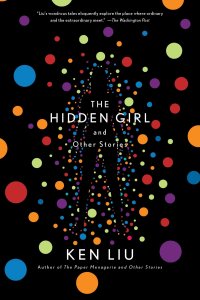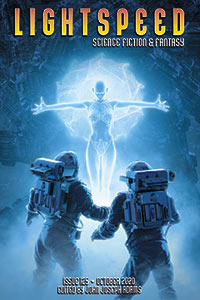Paul Di Filippo Reviews The Hidden Girl and Other Stories by Ken Liu
 The Hidden Girl and Other Stories, by Ken Liu (Saga 978-1982134037, $26, 432pp, hardcover) February 2020
The Hidden Girl and Other Stories, by Ken Liu (Saga 978-1982134037, $26, 432pp, hardcover) February 2020
Ken Liu is the kind of prodigious talent who makes mere mortals melt in despair at ever matching his accomplishments. He could have been content to remain a software engineer and lawyer, but instead he added to his CV the vocations of editor, translator, and fiction writer. If he had done any of those jobs poorly, we could have breathed a sigh of relief at his overreaching. But instead he’s excelled at them all, including almost single-handedly launching a boom in Chinese SF translated for English-language readers. And now here he is with a magnificent new story collection (the items herein appeared from 2011 through 2019), and a novel just down the pike (The Veiled Throne, book three in the Dandelion Dynasty series). What can we do but relax and bathe in the goodness and beauty?
In “Ghost Days”, Liu gracefully weaves three time strands into a resonant tapestry. On the planet of Nova Pacifica in the year 2313 a gene-tailored human hybrid named Ona must learn why the past matters, while on Earth in the years 1989 and 1905, ancestral humans reflect on their own heritage. “Maxwell’s Demon” starts with the shameful internment of Japanese-Americans during WWII. Our heroine, Takako, recruited as a spy by the USA, is sent back to Japan. There her psychical powers involve her in an uncanny Japanese experiment which, alas, ends in a tragedy which, although somewhat predictable, still hurts. Allied to Cadwell Turnbull’s The Lesson, “The Reborn” shows us an Earth conquered by aliens who impose their own brand of mutable personalities on humans who resist them. A kind of PKD vibe of surreal memory games pervades the creepy piece.
In the wake of a mass shooting, a hapless family lends its victim daughter as an avatar in a new kind of high-tech anti-gun crusade, little reckoning that not everyone is kindly enough to offer “Thoughts and Prayers” instead of bile. Cory Doctorow might have written the next two tales. “Byzantine Empathy” posits blockchain algorithms as a way of directly hooking up charity givers with charity receivers. But every advance has its dark side. And Maddie, a daughter mourning her dead father, finds a mysterious online presence standing in for the man in “The Gods Will Not Be Chained”. This is the kickoff to a mini-trilogy that expands exponentially. In “The Gods Will Not Be Slain”, Maddie and her virtual Dad participate in the collapse of civilization—with an aura of Neal Stephenson’s Fall—and finally in “The Gods Have Not Died in Vain”, Maddie and a virtual sister help usher in a post-scarcity age.
I should mention at this point that Liu’s protagonists, quite often women, are always deeply fleshed out and imbued with the full range of quirks, emotions and intellect, making them fully able to bear the weight of his novums. In fact, they are both the essential anchors and doorways into these tales.
“Staying Behind” is a post-Singularity story that finds the remnant humans facing hard choices about what constitutes the essential nature of humanity in “a garden inherited from the dead.” A short, sharp surprise awaits the earnest young filmmaker in the slightly satirical “Real Artists”, as she discovers just what lies behind the success of Semaphore studios.
Another post-Singularity story—revealing this trope as a keen concern of Liu’s—occurs in “Altogether Elsewhere, Vast Herds of Reindeer”, where mother and child reinstantiate themselves for a short trip through the ruins of Earth. A poignant vignette, “Memories of My Mother” uses time dilation to chart the maternal visits of an ailing woman. There are faint affinities with John Varley’s classic, “The Pusher”.
In the year 2645, an important and accomplished woman named Asa suddenly drops all her duties and perks to become a hermit on an Earth vastly altered from our time. Invocations of Thoreau and a sense of Kim Stanley Robinson’s 2312 permeate “Dispatches from the Cradle: The Hermit—Forty-Eight Hours in the Sea of Massachusetts”.
A wave of Zelaznyian SF-fabulism overcame me as I read “Grey Rabbit, Crimson Mare, Coal Leopard”, which blends shape-changing with the lives of the “midden miners,” poor citizens scavenging the remnants of our era. Slightly opaque to those not familiar with Liu’s novels, “A Chase Beyond the Storms” is a pendant to those books, and recounts, mainly, some martial doings and strategies. “The Hidden Girl” is the first pure fantasy in this volume, set in a kind of Asian neverland evocative of Crouching Tiger, Hidden Dragon. A young girl, trained as an assassin, is forced to acknowledge a higher oath: “There’s a greater promise we all must live by: to do what our heart tells us is right.”
Using the same disorienting time jumps as “Memories of My Mother”, but even more drastically and dramatically, “Seven Birthdays” lays out a compressed future history which nostalgically bites its own tail. There’s a faint flavor of Podkayne of Mars inherent in “The Message”, which finds an archaeologist father and his sulky, willful teen daughter marooned on a planet amidst alien ruins. And lastly, “Cutting” is a slight but strong fable reminiscent of Borges—or Rhys Hughes!
This collection highlights Liu, somewhat surprisingly, as a bit of a rigorous Hard SF guy with Humanist underpinnings. Despite certain flareups of topicality, he does not mire his stories in current-day controversies or trends, but always manages to step back for a bigger, more objective take. His tales walk the tightrope between tragedy and eucatastrophe, between pessimism and optimism. Paradoxically, his stories are precisely engineered with sweat and thought, but on the other hand one might almost say he’s tapped into some mystical Tao, developed the cosmic wu wei, or secret of effortless action. He’s like the “Dexterous Butcher,” who dances around the corpse of a cow with his blade, hardly seeming to move his hand. “Until—flop! the whole thing comes apart like a clod of earth crumbling to the ground. I stand there holding the knife and look all around me, completely satisfied and reluctant to move on, and then I wipe off the knife and put it away.”
 While you are here, please take a moment to support Locus with a one-time or recurring donation. We rely on reader donations to keep the magazine and site going, and would like to keep the site paywall free, but WE NEED YOUR FINANCIAL SUPPORT to continue quality coverage of the science fiction and fantasy field.
While you are here, please take a moment to support Locus with a one-time or recurring donation. We rely on reader donations to keep the magazine and site going, and would like to keep the site paywall free, but WE NEED YOUR FINANCIAL SUPPORT to continue quality coverage of the science fiction and fantasy field.






